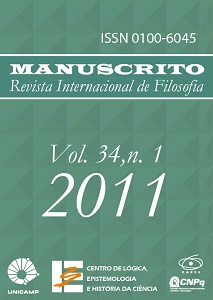Resumo
The present article shows that there are consistent and decidable manyvalued systems of propositional logic which satisfy two or all the three criteria for non-trivial inconsistent theories by da Costa (1974). The weaker one of these paraconsistent system is also able to avoid a series of paradoxes which come up when classical logic is applied to empirical sciences. These paraconsistent systems are based on a 6-valued system of propositional logic for avoiding difficulties in several domains of empirical science (Weingartner (2009)).Referências
CZERMAK, J. “Eine endliche Axiomatisierung von SS1M”. In Morscher et al., editors. Philosophie als Wissenschaft. Essays in Scientific Philosophy. Bad Reichenhall: Comes. p. 245–258, 1981.
DA COSTA, N. “On the Theory of Inconsistent Formal Systems”. Notre Dame Journal of Formal Logic, 15, p. 497–510, 1974.
MITTELSTAEDT, P. Quantum Logic. Dordrecht, The Netherlands: Reidel, 1978.
MITTELSTAEDT, P. “Does quantum physics require a new logic?” In Weingartner, P., editor. Alternative Logics. Do Sciences Need Them? Heidelberg, Germany: Springer. p. 269–284, 2004.
PRIEST, G. “Motivation of paraconsistency: The slippery slope from classical logic to dialethism.” In Batens, D., Mortensen, Ch., Priest, G., and van Bendegem, J. P., editors. Frontiers in Paraconsistent Logics. London: Research Studies Press, p. 223–233, 2000.
SCHURZ, G. “Relevant deduction”. Erkenntnis, 35, p. 391–437, 1991.
SCHURZ, G., WEINGARTNER, P. “Verisimilitude defined by relevant consequence–elements. A new reconstruction of Popper’s original idea”. In Kupiers, T., editor. What is Closer–to–the–Truth? Amsterdam, The Netherland: Rodopi, p. 47–77, 1987.
SCHURZ, G., WEINGARTNER, P. “Zwart and Franssen’s impossibility theorem holds for possible-world-accounts but not for consequence-accounts to versimilitude”. Synthese, 2009.
TARSKI, A. Logic Semantics and Metamathematics. Oxford, UK: Oxford University Press, 1956 WEINGARTNER, P. “Modal logics with two kinds of necessity and possibility”. Notre Dame Journal of Formal Logic, 9(2), p. 97– 159, 1968.
TARSKI, A. “Reasons for filtering classical logic”. In Batens, D., Mortensen, Ch., Priest, G., and van Bendegem, J. P., editors. Frontiers in Paraconsistent Logics. London: Research Studies Press, p. 315–327, 2000.
TARSKI, A. “Applications of logic outside logic and mathematics: Do such applications force us to deviate from classical logic?!” In Stelzner, W., editor. Zwischen traditioneller und moderner Logik. Paderborn: Mentis, p. 53–64, 2001.
TARSKI, A. “Reasons from science for limiting classical logic”. In Weingartner, P., editor. Alternative Logics. Do Sciences Need Them? Heidelberg, Germany: Springer. p. 233–248, 2004.
TARSKI, A. “Matrix-Based Logic for Application in Physics”. The Review of Symbolic Logic, 2(1), p. 132–163, 2009.
TARSKI, A. “Basis Logic for Application in Physics and its Intuitionistic Alternative.” In Busch, P., editor. Essays in Honour of Peter Mittelstaedt. Foundations of Physics, v. 40, p. 1578–1596, 2010.
WEINGARTNER, P., SCHURZ, G. “Paradoxes solved by simple relevance criteria.” Logique et Analyse, 113, p.3–40, 1986.


